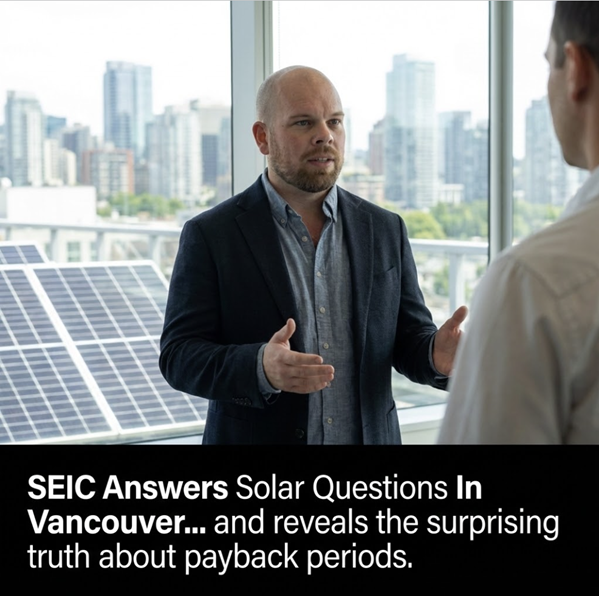SEIC Answers Solar Energy Questions On Vancouver Island
Halifax, Nova Scotia - November 21, 2025 - PRESSADVANTAGE -
Solar Energies (SEIC), the independent consumer resource behind SolarEnergies.ca, has released a new analysis aimed at answering the surge of solar questions coming from Vancouver Island homeowners. The company's latest guide, “Solar Energy Questions: Vancouver Island Answered 2025,” was written by solar analyst Vitaliy Lano.
https://www.youtube.com/watch?v=O_nUf6K4_xY

The guide responds to a sharp rise in searches about solar energy on Vancouver Island. Lano answers questions homeowners ask about cost, production, rebates, net metering, older homes, and financing, while repeatedly comparing Vancouver Island conditions to nearby Metro Vancouver. “People are typing those long, worried questions into Google while staring at a high BC Hydro bill,” Lano stated. “The goal of this guide is simple: take that anxiety and replace it with clear numbers and steps that actually match 2025 rules, not 2019 blog posts.”
A key driver behind the new guide is the policy shift that has confused many British Columbia homeowners. The former Canada Greener Homes Grant is closed to new applicants, yet a new BC Hydro solar and battery rebate is fully active, offering up to $5,000 for grid-connected solar panels and up to $5,000 for battery storage, subject to caps of 50% of project and battery costs. Lano’s earlier Vancouver cost report shows how easily homeowners mix up the now-defunct federal grant with the new provincial-utility program, since both talked about “$5,000 for solar.” “The numbers are identical, and that’s where people get lost,” Lano commented. “One offer is gone, the other is active and tied directly to BC Hydro’s Self-Generation (net metering) program. Sorting that out is the first step before anyone signs a quote.”
SolarEnergies.ca's guide lays out real cost ranges. On Vancouver Island, a typical 5 kW system is shown in the $14,500–$17,500 range, while an 8 kW system sits roughly between $23,200–$28,000, with larger 10 kW systems in the $28,000–$34,000+ band before incentives. In Vancouver, the cost guide narrows the provincial average to about $2.30–$3.00 per watt, listing sample projects from 4 kW at $10,000–$13,000 up to 12 kW at $27,000–$36,000 before rebates. Once the BC Hydro rebate is applied, an 8 kW Vancouver system priced at, for example, $21,000 can see a $5,000 reduction on the solar side, bringing the net cost to about $16,000. Adding a 10 kWh battery can unlock a second $5,000 rebate, provided the system meets eligibility rules. “Once the math reflects actual 2025 incentives, the payback often drops into the 10-15 year range,” Lano added. “That’s very different from the 20-plus-year stories people still hear from older content.”
SEIC guide also tackles Vancouver’s “too rainy for solar” reputation head-on. Lano cites production estimates showing that a 10 kW system in coastal BC can generate around 11,000 kWh per year, close to or above the annual use of a typical BC home, which often falls between 9,000 and 12,000 kWh. He also points to data from Natural Resources Canada showing that a properly installed 1 kW system in Metro Vancouver produces roughly 950–1,100 kWh per year, and notes that Vancouver receives more solar radiation than Berlin, despite Germany’s more than 80 GW of installed solar capacity. “The data is clear,” Lano expressed. “Vancouver has strong summer production, solid spring and fall, and weaker winters. The idea that our climate ‘kills’ solar is simply wrong. The real job is to size the system around that seasonal pattern and let BC Hydro’s credits smooth it out.”
Financing and the fear of overpaying sit at the core of the homeowners' questions SEIC is now addressing. The guide highlights a strategy of stacking incentives: the BC Hydro solar, battery rebate, the provincial PST exemption on solar equipment, and 0% or low-interest financing from select installers. In a Victoria case study published earlier this fall, Lano shows a $22,000 system reduced by a $5,000 BC Hydro rebate, leaving $17,000 to be financed over roughly 15 years at ~0.99%, with an estimated monthly payment of about $98 against monthly savings of around $120 - a scenario that leaves the homeowner cash-flow positive from day one. “The real question many families ask is, ‘Can zero-down solar cut my total monthly outlay below my current BC Hydro bill?’” Lano stated. “Once people see that a reasonable loan payment plus a much smaller hydro bill can be less than what they already pay today, the project stops feeling like a luxury item and starts looking like infrastructure.”
For more information about solar panels in Vancouver and Vancouver Island, visit SEIC's website.
###
For more information about Solar Energies In Canada SEIC, contact the company here:
Solar Energies In Canada SEIC
Vitaliy Lano
2368680609
[email protected]
Information contained on this page is provided by an independent third-party content provider. XPRMedia and this Site make no warranties or representations in connection therewith. If you are affiliated with this page and would like it removed please contact [email protected]

